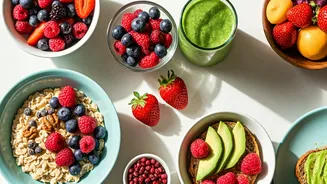The Fiber Factor
The cornerstone of a colon-friendly breakfast is fiber. Recent peer-reviewed studies have strongly suggested that breakfasts rich in fiber significantly
lower the risk of developing colon cancer. Fiber acts like a natural cleanser for the digestive system, facilitating the smooth passage of food and waste. This action helps to minimize the time harmful substances linger in the colon, reducing the potential for damage and, consequently, the chances of cancer development. Furthermore, fiber promotes the growth of beneficial gut bacteria, which play a crucial role in maintaining a healthy colon environment and further protecting against colon cancer development. It is important to emphasize the importance of regular fiber intake as a central component of an overall health-conscious lifestyle. This is vital for sustaining digestive wellness and decreasing the likelihood of various colon-related health issues.
Breakfast Food Choices
Choosing the right foods for breakfast can make a significant difference in colon health. Start your day with options that are naturally high in fiber. Whole grains are excellent choices, including oats, whole-wheat bread, and bran cereals. These foods provide a substantial dose of fiber and other essential nutrients. Fruits and vegetables are also essential components. Berries, apples, and bananas offer a good amount of fiber and beneficial antioxidants. Consider adding vegetables such as spinach or tomatoes to your breakfast. Adding these elements will help promote a healthy colon. Additionally, incorporating a variety of fiber-rich options into your breakfast routine ensures a wider range of nutrients, contributing to enhanced gut health and overall well-being. Proper breakfast selection significantly impacts the maintenance of colon health, making your daily food decisions important.
Understanding the Science
The relationship between breakfast and colon health is rooted in scientific understanding. Studies explore how dietary choices influence the risk of colon cancer. Fiber, a key element in this discussion, performs a vital function in the digestive process. It increases stool volume, hastening waste transit through the colon and minimizing exposure to potentially harmful substances. Research also shows that fiber aids in binding and eliminating cancer-causing agents from the body. Another beneficial aspect is the role of breakfast in managing blood sugar levels and inflammation, both of which are linked to cancer risk. Regular fiber intake helps maintain a balanced gut microbiome, supporting a healthy colon. It is essential to recognize that while breakfast is beneficial, overall dietary habits and lifestyle choices are equally important. These integrated methods contribute significantly to colon cancer prevention.
Making Breakfast Changes
Implementing changes in your breakfast routine is a straightforward process. Start by gradually introducing more fiber-rich foods to your morning meals. This could involve swapping refined cereals for whole-grain options or adding a side of berries and a sprinkle of flax seeds to your yogurt or oatmeal. Experiment with different recipes to find breakfast combinations you enjoy and that align with your health goals. Preparing breakfast at home allows you to control the ingredients and ensure they are aligned with your health objectives, rather than relying on less healthy fast-food options. Reading and understanding food labels is crucial to making informed choices. It is also beneficial to consult with a healthcare professional or a registered dietitian who can provide personalized guidance based on individual health needs. Small, consistent changes in your breakfast habits can significantly improve your gut health and contribute to colon cancer prevention, creating a better foundation for your health journey.





















